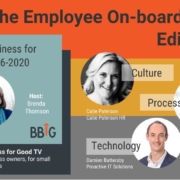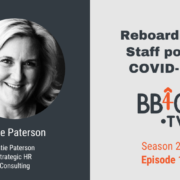Recruitment can be an arduous, time-consuming, and costly process. And, when you finally find the ‘right’ person for your organisation, you want them to enjoy their workplace so they choose to stay with you for the long-term, not look elsewhere for job satisfaction and fulfilment. An organised, professional, and positive onboarding experience is a fabulous introduction to your business! Critical in managing and retaining great team members, structured onboarding acts as a catalyst for employee satisfaction, engagement, and retention.
“Through onboarding, companies enjoy 54% greater productivity from their new hires.” (source: Human Resources Director)
What is a Successful Onboarding Program?
From an HR perspective, the recruitment and selection process often takes centre stage. But the key to successful integration of your new employee is preparation – before they even begin their first day.
A comprehensive onboarding program will benefit your entire organisation. It helps your new starter to feel comfortable and invested, and to quickly reach their full potential. A planned, well-managed and smooth transition supports your new staff member, your team, and you!
Onboarding starts long before your new starter’s first day and continues to their first-year anniversary.
With the new starter experience at the forefront, a good onboarding strategy is overlaid with the foundational role that company culture plays in anchoring the process.
Develop a Clear and Concise Onboarding Program
To create a successful workplace environment, ensure your employees are at the centre of everything you do. This starts with onboarding.
To prepare a structured program:
-Be aware of the key steps/milestones, and key actions included in these
-Develop checklists, tools and resources for each step of the onboarding process. This will ensure tasks are not forgotten and reduces stress for both you and your new starter.
-Include other team members required to make the onboarding process successful during each step/milestone
-Include the four important areas of Culture, Outcomes, Administration and Team in every step of the onboarding process
-Ensure professional and personal development goals are set and reviewed throughout the timeline
-Plan regular engagement with your new starter to provide support and answer any queries
-Gather feedback from your new starter’s peers and ‘buddy’ to determine how they are settling into their role and the business
-Include social experiences so your new starter builds connection with their peers and managers.
Induction: HR and Beyond
Traditionally, induction has been driven by compliance; paperwork, forms and ‘ticking the boxes’ are the centre of the program. While this is a key component of onboarding, the experience of your new starter should be at the forefront of this, and any, program you develop for your business.
Here are some valuable tips to develop a successful onboarding program:
–Take the time to explain and answer questions about your company culture and show patience to help your new starter build confidence in their role
-Create a collective responsibility for the success of your new starter by sharing onboarding duties with their peers
-Ask current team members about their onboarding experiences to gain insight into the process
-Don’t overload your new starter with too much paperwork on their first day
-Prepare simple logistics – set up their workstations/desk and technology needs, and organise their business cards – so everything is ready for their first day
-Don’t expect your new employee to ‘hit the ground running’. Understand that the time you invest in getting them up to speed is a reflection of the importance of their role.
Structured Onboarding Supports your Staff from the Start
People worry about many situations and outcomes when they begin a new role. Whether they join your team onsite, or their work includes more flexible remote structures, they deserve to enjoy a well-crafted welcome. It is important to provide training and orientation experiences which boost their confidence, integration, and productivity – right from the start.
From a practical onboarding perspective, ensure they are set up in payroll, their equipment is ready, and their emails work. But you also need to consider any social and emotional fears that come hand-in-hand with new beginnings. Onboarding is the perfect opportunity to remove many of their worries and make their transition as smooth as possible.
Five Phases to Successful Onboarding
The onboarding process will be different for every business, depending on the size, workplace structure and culture, and HR policies and procedures already in place. We have developed a five-phase process that assists you to deliver a training and orientation experience that will immediately boost the confidence, productivity, and resilience of your new staff members.
Create and use your customised system time and again to multiply workplace engagement and productivity across your entire team.
Phase One: Engage and Prepare
-Preparation is the key!
-Ensure you put together all the tools and resources your new starter will require.
Phase Two: First Day
-First impressions are vital! The truth is, most new employees decide whether they feel at home in a new job during the first three weeks.
-Create a positive impression that supports your new staff member through an integrated approach.
Phase Three: First Month
-Your new starter’s success in these first few weeks is central to their investment into the responsibilities of their role and the contribution they can make to fulfilling your company mission.
-Develop the processes and resources to ensure that your new starter is comfortable, confident, and absolutely clear on how valuable they are to the company.
Phase Four: Probation Period
-The cost of poor onboarding doesn’t just affect your employees, it has huge impacts on your bottom line.
-Set highly focussed goals for your new starter to achieve during this time. This will create momentum that fuels achievement and engagement.
Phase Five: First Anniversary
-Typically, it takes eight months for a newly hired employee to reach full productivity, yet the average onboarding program lasts only three.
-Arriving at the one-year mark with your new team member is an achievement worth celebrating! Ensure you celebrate your new starter reaching such a huge milestone, and plan ahead to keep the momentum going.
-The end of the first year is also a good time to discuss how they feel about their job. This feedback will give you the opportunity to make any necessary adjustments to their position requirements or workplace environment.
‘I truly believe that onboarding is an art. Each new employee brings with them a potential to achieve and succeed. To lose the energy of a new hire through poor onboarding is an opportunity lost.’
Sarah Wetzel, Director of Human Resources at engage: BDR
Create an effective onboarding experience for your new starters with this FREE Induction and Onboarding Checklist .
Launching soon – Induction and Onboarding online program to take you through the five-phase process to develop your own customised onboarding system. Contact us to to find out more.







